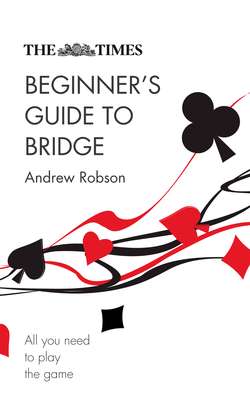Читать книгу The Times Beginner’s Guide to Bridge: All you need to play the game - Andrew Robson - Страница 20
Extra tricks by force
ОглавлениеSo far you have cashed your ‘top’ tricks and your opponents have not had a look-in. Now consider the next three examples. In each case you are missing a high, winning card (or cards), and in order to make tricks in the suit you must ‘force’ out that card from the opposition partnership.
In (a), you are missing ♠A and need to force it out from the opposition. You can use any high card in the suit to do this, then go on to win the other two high cards when you regain the lead. In this way you promote two tricks by ‘force’. Note that if your opponent withholds their ♠A on the first round, you’ll win the trick anyway, effectively ‘promoting’ the high card you use to lead. You can then sacrifice a second high card in order to promote the third. Both scenarios give you your two tricks.
Example (b) contains the same high cards but in this case it’s better to start specifically with ♠Q (or ♠7 to ♠Q) to force out ♠A. You’ll then hold ♠2 in one hand and ♠KJ in the other, which avoids ‘blockage’.
In (c), you need to force out ♠A and ♠K. To do this, sacrifice two of your sequential cards ♠Q, ♠J, ♠10, ♠9 (note that sequential cards between your hand and dummy’s are worth the same). Then you have promoted the two cards that remain into two force winners.
Useful tip
Don’t be overly concerned about losing the lead, particularly early in the play. You have to lose to win in bridge.
